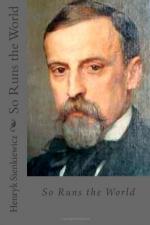To all that Doctor Pascal is a positivist. He does not wish to affirm anything, but he does affirm that actual state of science does not permit of any further deductions than those which on the strength of the observation of known facts can be deducted, therefore one must hold them, and neglect the others. In that respect his prejudices do not tell us anything more than newspaper articles, written by young positivists. For the people, who are rushing forward, for those spiritual needs, as strong as thirst and hunger, by which the man felt such ideas as God, faith, immortality, the doctor has only a smile of commiseration. And one might wonder at him a little bit. One could understand him better if he did not acknowledge the possibility of the disentangling of different abstract questions, but he affirms that the necessity does not exist—by which he sins against evidence, because such a necessity exists, not further than under his own roof, in the person of his niece. This young person, brought up in his principles, at once loses the ground under her feet. In her soul arose more questions than the doctor was able to answer. And from this moment began a drama for both of them.
“I cannot be satisfied with that,” cries the niece, “I am choking; I must know something, and if your science cannot satisfy my necessity, I am going there where they will not only tranquillize me, not only explain everything to me, but also will make me happy—I am going to church.”
And she went. The roads of master and pupil diverge more and more. The pupil comes to the conclusion that the science which is only a slipknot on the human neck is positively bad and that it would be a great merit before God to burn those old papers in which the doctor writes his observations. And the drama becomes stronger, because notwithstanding the doctor being sixty years old, and Clotilde is only twenty years old, these two people are in love, not only as relations are in love, but as a man and woman love each other. This love adds more bitterness to the fight and prompts the catastrophe.
On a certain night the doctor detected the niece in a criminal deed. She opened his desk, took out his papers, and she was ready to burn them up! They began to fight! Beautiful picture! Both are in nightgowns—they pull each other’s hair, they scratch each other. He is stronger than she; although he has bitten her, she feels a certain pleasure in that experiment on her maiden skin of the strength of a man. In that is the whole of Zola. But let us listen, because the decisive moment approaches. The doctor himself, after having rested a while, announces it solemnly. The reader shivers. Will the doctor by the strength of his genius tear the sky and show to her emptiness beyond the stars? Or will he by the strength of his eloquence ruin her church, her creed, her ecstasies, her hopes?
In the quietness the doctor’s low voice is heard:




